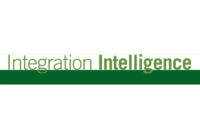After attending the 2011 RSA Security conference in San Francisco recently I was struck by how much momentum that cloud computing and cyber security are generating. Last year’s event was impressive, but I sensed a buzz during the entire show this year. I believe these two trends will alter the landscape of the traditional security industry and that it is happening even faster than I thought.
I recommend a book titled “The Big Switch” by Nicholas Carr. The theme is that the future of computing follows the history of the electric utility industry. Early power requirements were generated by people and companies (waterwheels, steam, coal, etc.) until the electric grid was constructed and power could be distributed over a network. In the future, computer hardware in the home and IT departments in companies will go the way of the waterwheel and be replaced by services generated over the Internet, as in cloud computing. We see this today in mobile computing devices and social networks (facebook, twitter), and business applications (salesforce.com).
There is a triangle of components that is driving this momentum forward. Technology convergence generally, as in our mobile phones, is rather obvious. In fact, calling the device a “phone” does not do it justice. However, faster chips and network bandwidth have been the real accelerant to this momentum as more functionality is now available at light speed. Finally, as we share more information, cyber crime is a growing problem — human nature evidently. It has become a very serious economic problem.
Cloud computing makes sense from a financial perspective and a security standpoint. Upwards of 75 percent of the costs incurred by the IT department go toward hardware, software, services and personnel. Securing large global cloud providers is more efficient than attempting to secure billions of end points (mobile users), which is impossible. Security concerns are driving cloud computing adoption as much as the cost savings.
When considering these two trends, (cloud computing and cyber security), and their importance (cost savings and security), it is easy to see a changing environment for many physical security integrators.
Granted, the move to the cloud will occur over time and in increments. Hybrid and private clouds are being deployed today and some information may never go to the cloud at all. However, most of it will.
Today, it is customary for start up and SMB firms to outsource services to cloud providers as part of the business plan (payroll, accounting, sales forecasting, etc.) and never consider having an IT department at all. So if we look out five to ten years, and this is the window that you wanted to sell your integration business, it might be very tough. The trend is not your friend if your business model is traditional security integration services and networking standalone buildings and small businesses.
The solution is to provide cloud computing and cyber security consulting as part of your services to customers. They are confused and need guidance in these areas. Consider attending venues like RSA, Black Hat, Cloud Computing Expo and InterOp. Do yourself a favor and don’t ignore these market moves. Be part of your customer’s migration strategy rather then opposing the obvious.
While you could take your time embracing security convergence from analog to IP, this migration cycle is happening in technology time, as in Moore’s law — double the speed at half the price, every 18 months (conservatively). Explore these two “security” opportunities. It’s called “The Big Switch” for a reason.





